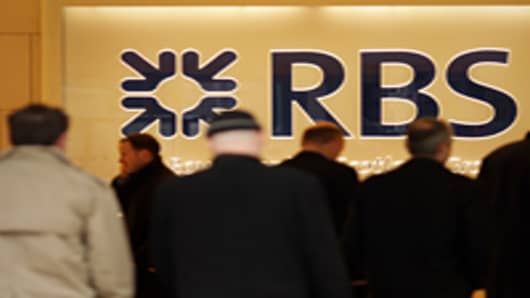The British government is considering deleveraging its shares in state-owned banks Lloyds’ Banking Group and Royal Bank of Scotland (RBS) by issuing stock to every taxpayer in the country, it emerged on Monday.
Every single taxpayer in the UK could be handed 1,000 pounds ($1,617) in shares by the government, as it seeks to recoup the money it spent bailing out both the banks after the financial crisis in 2008.
Monday sees the launch of a campaign by the Center for Policy Studies think tank to put the proposals into practice, but no decision is likely to be made until after the final report on banking reform is published by the Vickers Banking Commission in September.
“The British people have weathered the risk of bailing out the banks and now deserve to reap the rewards. The message is simple. If there is a gain on our bank shares it is our gain," Lord Saachi, chairman of the Center for Policy Studies, told the Sun newspaper.
The state owns 84 percent of RBS and 43 percent of Lloyds. It has been examining possible ways to reduce its share holding in both the banks for the past year.
Nick Clegg and the Liberal Democrats are extremely keen to see the proposals carried forward by the government, to the point that the Lib Dems are already trying to push them through their own internal party processes in order to make it official party policy, a person familiar with the situation told CNBC.com.
Lib Dem MP Stephen Williams, co-chairman of the Liberal Democrat's Treasury policy committee, is known to be a particular supporter of the proposals and has already written in support of them in an article for the think-tank Center Forum.
Avoiding a Mass Sell-Off
Government ministers and civil servants have been concerned by the possible effect a mass sell-off of the state's shares would have on the overall market and in particular on the banks in question.
Portman Capital was one of a number of groups which had been talking to senior Treasury civil servants for the past year, according to a source familiar with the discussions.
The proposal put forward by Portman Capital Partnersappears to get around this issue, known as share overhang – whereby investors are aware that a large shareholder wants to offload a large number of shares at a particular price and so short their own holdings with a view to buying them back at a cheaper price – by ensuring the government doesn’t sell all of the shares it owns in the banks at the same time, the source said.
The Portman report suggests that 80 percent of shares be distributed among the public, while also proposing that the government use its remaining 20 percent in the banks to make a 10 billion pounds share placement and then issue a 5 billion pounds convertible bond.
Every taxpayer in the country could receive around 1,900 shares in both RBS and Lloyds – 1,450 RBS shares and 450 Lloyds shares – once the share price of both banks reaches the level they were at when the government bailed them out: 51p for RBS and 74p for Lloyds.
Ryan Bourne, research economist at the Center for Policy Studies told CNBC.com talks with Treasury officials had been “extremely positive.”
“The Treasury likes it, the only concerns they have are around how easy it would be and the practical decision in terms of how you would distribute the shares,” Bourne added.
A spokesman for the Treasury told CNBC.com the government had made no decisions on the sale of RBS and Lloyds and did not want to pre-empt the Independent Banking Commission's report on the future of the banking industry. The final report is due to be published in September.
"We have always said we want to maxmise stakeholder vaue and we want to see an increase in competition but we have set up the independent banking commission and we are not going to pre-empt its findings by talking about various proposals," he added.


